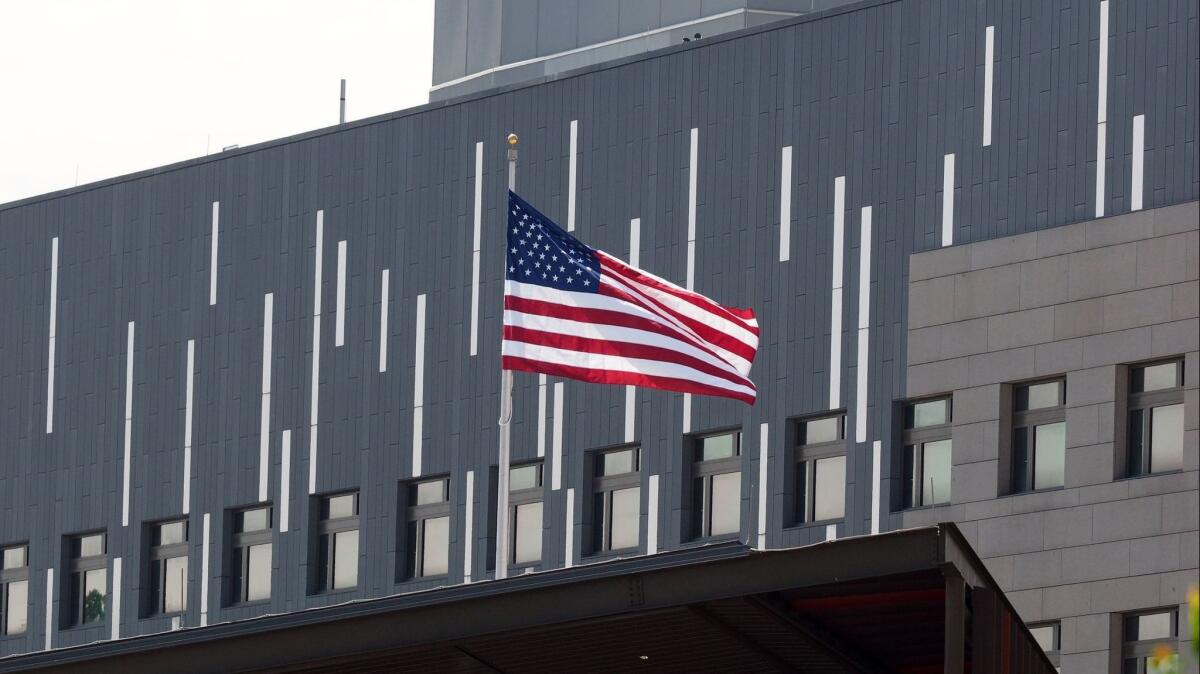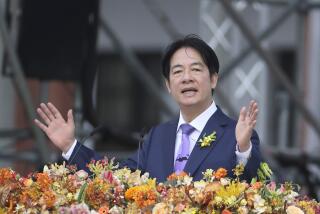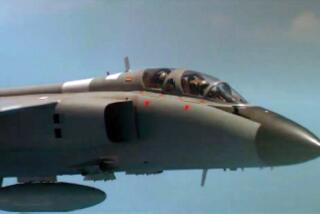Small U.S. Marine presence in Taiwan could ruffle Chinese feathers

Reporting from Taipei, Taiwan — With a new de facto American Embassy in Taiwan nearly completed, a spokesperson announcing the opening of the 161,000-square-foot, privately run compound said last week that U.S. Marines have periodically protected the organization’s headquarters since 2005 and did not rule out future deployments.
For years, the U.S. had not commented on the presence in Taiwan of any military personnel, who are said to have operated discreetly inside the compound of the American Institute in Taiwan rather than standing guard at entrances.
The vague acknowledgement from a spokesperson for the American Institute in Taiwan could ruffle feathers again in China, which has long claimed that Taiwan is a part of its territory. It is the latest in a series of incidents over the past year with the potential of further roiling U.S.-China relations.
Over the last nine months, U.S. Navy ships have passed five times through the Taiwan Strait separating the island from China. And less than a month ago, Taiwanese President Tsai Ing-wen said her government had asked Washington for a package of American-made F-16V fighter jets.
China, meanwhile, flew two fighter jets March 31 over its median line with Taiwan, a surprise to defense officials on the island. A Chinese report the next day said the flyover was prompted by the actions of Washington, not Taipei.
Over the years, the U.S. has taken a series of measures demanded by Beijing to avoid a formal diplomatic presence in Taiwan. The American Institute is a nonprofit organization composed of former U.S. government officials who “retire” or take leave to work there — processing visas and handling other consular services — so as not to upset relations.
With each generation, the people of Taiwan feel more Taiwanese — and less Chinese »
Across the globe, more than 1,000 Marines work in a security group guarding more than 175 missions. But any military presence whatsoever in Taiwan remains a touchy subject.
China would express “anger” and sound “warnings” to the United States if more Marines reach Taipei, predicted Alexander Huang, a strategic studies professor at Tamkang University in Taiwan. But it might temper any protestations if the only presence remains Marines guarding the de facto embassy, he said.
A sale of American-made F-16Vs fighter jets, on the other hand, would more certainly outrage Beijing, said Alex Chiang, international relations professor at National Chengchi University in Taipei. “Whether that goes forward or not is an indicator” of strength in U.S.-Taiwan ties, Chiang said.
U.S. officials technically have 120 days after a sales request to evaluate which military hardware best matches Taiwan’s needs and reports have emerged that the White House has put the sale of jets on hold until a major trade agreement is reached between the U.S. and China.
A trade deal and the timing of a Taiwan arms sale “may be correlated,” Huang said, but the sale is unlikely to hinge on Sino-U.S. agreements. “The bargaining chip is not the fighter jets, it’s the timing,” he said.
President Trump has particularly championed closer Taiwan relations, in part to pressure China over trade issues, political scholars have said. His administration has approved two other arms sales to Taiwan, including a $1.42-billion package announced in June 2017.
U.S. officials see Taiwan as part of a chain of Western-allied democracies in East Asia. The American Institute spokesperson said in late March that Taiwan “plays a key role in maintaining a free and open Indo-Pacific region” and that its “efforts to maintain its self-defense capability are critical to regional stability.”
U.S. officials have called out China over its diplomatic and military pressure against Taiwan since 2016, when voters on the island elected Tsai. The president, backed by a pro-independence party, rejects unification with China.
“Now with China escalating the pressure on Taiwan, the atmosphere here in D.C. is one that points to rising support of Taiwan,” said Yun Sun, East Asia Program senior associate with the Stimson Center think tank in Washington.
China had flown military aircraft near Taiwan a dozen times before the most recent median line incident and has sent aircraft carriers through the Taiwan Strait. It has also persuaded five countries to switch diplomatic recognition from Taipei to Beijing since 2016.
Sorties by “ships and aircraft in ways that signal hostility toward Taiwan are relatively low-cost for China,” said Denny Roy, senior fellow at the East-West Center, a research organization in Honolulu. “These will probably continue and might intensify.”
Taiwan would support any deployment of Marines at a U.S. diplomatic property, a Cabinet spokesman said in mid-2018.
Tsai said last month that Taiwan will become “more active in aligning ourselves with other like-minded countries” facing issues with China.
“We are taking a much more aggressive approach to counteract the Chinese government’s infiltration of our society and economy, as well as their interference in our domestic affairs,” she said in a speech hosted by the conservative Heritage Foundation think tank.
Jennings is a special correspondent.
More to Read
Sign up for Essential California
The most important California stories and recommendations in your inbox every morning.
You may occasionally receive promotional content from the Los Angeles Times.










